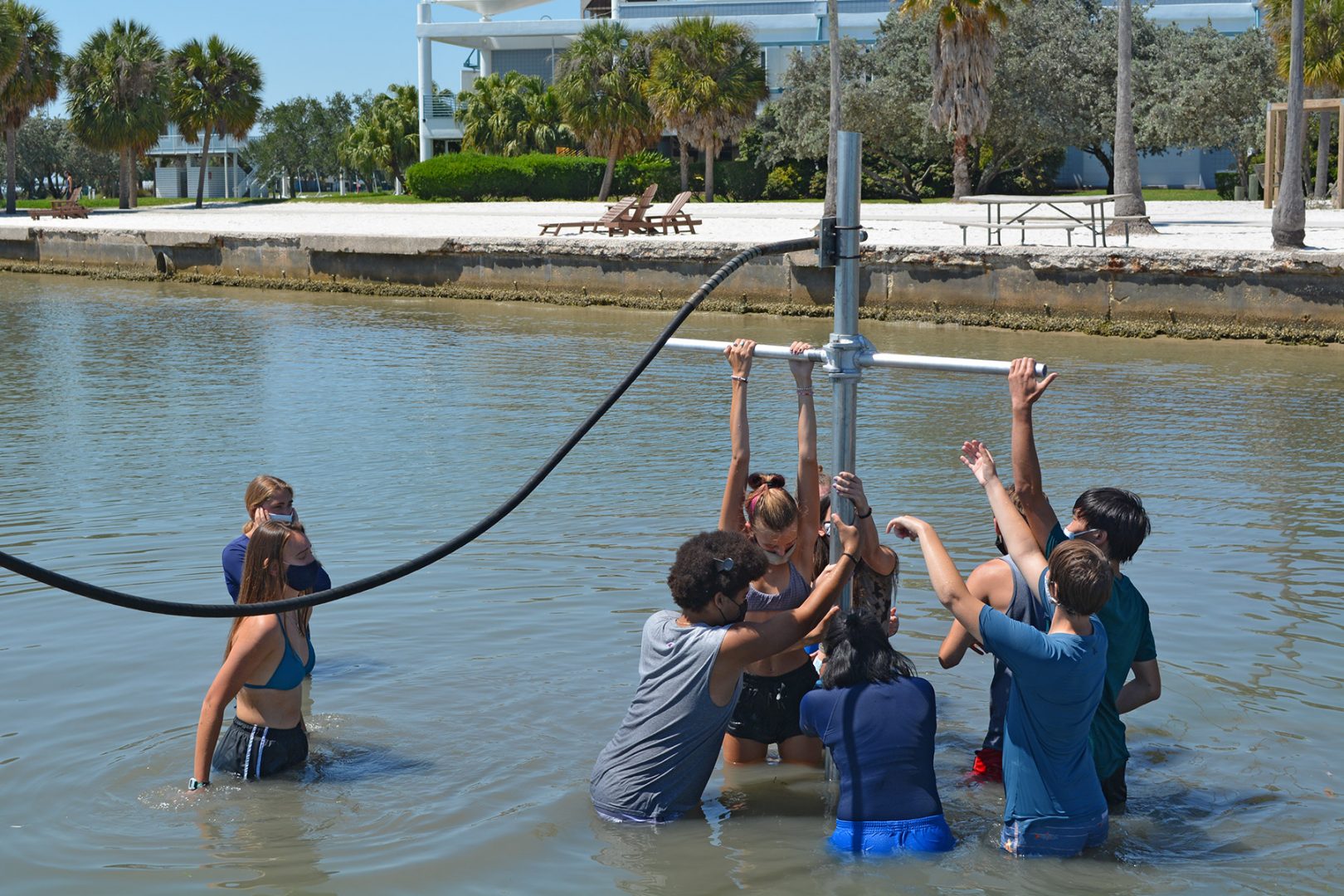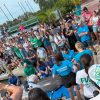
First-year students sample sediment from the seafloor along the east end of Eckerd’s South Beach as baseline measurements for use in other studies. Photo: Rebekka Larson ’01
The problems are enormous and affect everyone on the planet. But the number of people who could come up with solutions is not only shrinking, it’s not a reflection of who we are.
The number of global issues related to geoscience—issues such as climate change, severe weather events and contamination of marine systems—has steadily increased over the last several decades, the National Science Foundation (NSF) warns.
But at the same time, there has been a significant decrease in the number of geoscience students at the undergraduate level, and very little diversity.
Enter Gregg Brooks, professor of marine science and geosciences at Eckerd College.
In an effort to reverse that trend, in August the NSF awarded Eckerd a $389,413 grant written by Brooks and his colleagues with the goal of increasing the number and diversity of students entering the geoscience workforce.
“The primary objective,’’ the grant states, “is to integrate ongoing research with new and unique undergraduate courses … and to enhance pathways for diverse cohorts of undergraduates to thrive in geoscience careers.’’
Those new and unique courses at Eckerd will be titled Scientist at Sea (Parts A and B) and will consist of on- and off-campus research, peer mentorship, and networking opportunities. The courses will be integrated with a new College initiative titled Diversifying the Marine Science Pipeline, which will facilitate the recruitment and retention of a more diverse student population interested in pursuing geoscience careers.
The primary target will be prospective students, first-years and sophomores at Eckerd, and the enticement will be the chance to work on projects directly tied to critical issues such as red tide and oil spills in the Gulf of Mexico.
It’s not that Eckerd lacks marine science students. Nearly 50% of its incoming first-years—about 360 new students this year—are marine science majors. But nearly all of those students eventually find their way to marine biology or a related field. Not geosciences.
Eckerd currently graduates about 10–12 marine science geology students and about five geoscience students per year.
“We’re trying to attract some of those marine science students into geoscience,’’ says Brooks, who was the lead researcher for the grant project. “And it’s not just a challenge for Eckerd. It’s that way everywhere. The NSF found out that not only are not enough students going into the geosciences, not enough are from underrepresented groups.”
But if students know they can work on something that could have a meaningful environmental impact, and if they get the experience that could land them a job later on in government or the private sector, they might sign up.
“Once they make that link,’’ Brooks says, ”once they get excited, then we’ve got them.’’
And as the grant states, “It is well documented that culturally relevant, problem-based research experiences, such as the Deepwater Horizon oil spill, which serves as the foundation of this project, can be a very successful recruitment tool.’’
If nothing else, what the grant provides might help give prospective students a better idea of what marine science includes.
“It’s not just biology,” says Eckerd senior Sophia Chernoch, who is a marine science major minoring in geosciences. “A lot of people just didn’t know geoscience existed until they got here. They didn’t understand all the different things you can do. It’s an awesome program.”
Sophia, who hails from Westminster, Massachusetts, plans to be a peer mentor in the program this year. “And hopefully I can inspire interest in geoscience,” she adds, “because I think there will be a great need for it in the future.”
Brooks noted that Patrick Schwing ’06, assistant professor of marine science, and Rebekka Larson ’01, marine science instructor, played key roles in writing the grant, which continues a string of awards for the Marine Science Program. Over the past decade, Brooks and his Eckerd marine science colleagues have secured $1.2 million in grant funding for their work.
The focus now is making geoscience—the study of earth—attractive to a wide and diverse audience.
“And the grant,” Larson says, “is a jump start.”












